- Home
- Lloyd Jones
Mr Vogel
Mr Vogel Read online
MR VOGEL
“***** A manuscript, allegedly discovered in an old pub, provides the focus for this extraordinary tale. Mixing fact and fiction, Jones shoehorns elements of the detective novel, a great deal of mythology and some uncommon history into what must be one of the most dazzling books ever written about Wales.” Independent on Sunday
“Mr Vogel is surely one of the most remarkable books ever written on the subject of Wales – or rather around the subject, because it is an astonishing mixture of fantasy, philosophy and travel, expressed through the medium of that endlessly figurative country.” Jan Morris
“A sprawling, genre-hopping stew of a novel that will absorb anyone with any kind of interest in Wales.” Dan Rhodes
“In the spirit of Sterne (trapped on a wet weekend in Aberystwyth) or Flann O’Brien (enduring the final cure), Lloyd Jones delivers the tour-guide Wales has been waiting for: warped history, throwaway erudition, sombre farce. Stop what you’re doing and listen to this mongrel monologue.” Iain Sinclair
“A rambling, redemptive mystery, stuffed full of all things Welsh: rain, drink, wandering, longing, a preoccupation with death and the life that causes it. A bizarre and uncategorisable, and therefore essential book” Niall Griffiths
“Sit back and soak up the literary references, the superb metaphors and quite brilliant kindness of the writing. We need more writers like Jones.” Western Mail
“Jones has written a novel which purports to be the story of a quest for the Vogel Papers, but it is also a memoir and a travel book. I have enjoyed it immensely. It may turn out to be the Welsh answer to Ireland’s Flann O’Brien.” Meic Stephens, Cambria
To Ella my daughter for the future and
Bedwyr Lewis Jones for the past.
In memory of the eight children who died at
St Bride’s fever hospital and who are buried at
St Bridget’s Church, St Bride’s, on
the shores of Pembrokeshire
&
Marianne, the beautiful crippled daughter
of Hafod Uchtryd, Cwmystwyth.
Seren is the book imprint of
Poetry Wales Press Ltd
Nolton Street, Bridgend, CF31 3BN, Wales
www.seren-books.com
© Lloyd Jones 2004, reprinted 2004, 2005
ISBN 1-85411-380-1
The right of Lloyd Jones to be identified as the author of this work has been asserted in accordance with the Copyright, Designs and Patents Act, 1988.
A CIP record for this title is available from the British Library.
This book is a work of fiction. Apart from historical figures and events, the characters and incidents portrayed are the work of the author’s imagination. Any other resemblance to actual persons, living or dead, is entirely coincidental.
Waldo’s raid on personal files at the Robert Jones and Agnes Hunt Hospital, Gobowen, is a complete fiction.
All rights reserved. No part of this publication may be reproduced, stored in a retrieval system, or transmitted at any time or by any means electronic, mechanical, photocopying, recording or otherwise without the prior permission of the copyright holder.
The publisher works with the financial assistance of the Welsh Books Council.
Printed in Plantin by Bell & Bain Ltd, Glasgow.
PART ONE
I Nennius, pupil of the holy Elvodug, have undertaken to write down some extracts that the stupidity of the British cast out; for the scholars of the island of Britain had no skill, and set down no record in books. I have therefore made a heap of all that I have found, both from the Annals of the Romans and from the Chronicles of the Holy Fathers, and from the writings of the Irish and the English, and out of the tradition of our elders.
Many learned scholars and copyists have tried to write, but somehow they have left the subject more obscure, whether through repeated pestilence or frequent military disasters. I ask every reader who reads this book to pardon me for daring to write so much here after so many, like a chattering bird or an incompetent judge. I yield to whoever may be better acquainted with this skill than I am.
Nennius, Historia Brittonum, early ninth century
Yntau, Gwydion, gorau cyfarwydd yn y byd oedd. (And he, Gwydion, was the best story-teller in the world.)
Math fab Mathonwy, Pedair Cainc y Mabinogi
THE VOGEL STORY: AN INTRODUCTION
MANY YEARS AGO a strange incident took place in this town. The event, which went unobserved by the rest of the world, would have sunk into obscurity here also, but for the scribblings of an old bar tender and dogsbody at the Blue Angel.
The Blue Angel was a tavern at the main crossroads in the old docklands. The building has long ceased to be an inn – nowadays it is an antiquarian bookshop, leaning out towards the road, untidily, like one of the many piles of books stacked inside it.
The building is shambolic, and the paint is peeling on its black-and-white timbered façade. There is nothing to indicate that once it was the main stopping point for early travellers visiting this small corner of the globe.
Only a few people know the significance of a metal badge, showing a dancing bear, nailed to the gnarled oak lintel over the doorway.
No-one remembers the barman’s name nor what happened to him. It is clear that he worked there for many years. His writings came to light, quite accidentally, whilst workmen were renovating the roof. Thrust into a crevice above a purlin they discovered a rough manuscript, almost illegible, written in faded pencil on the back of tradesmen’s letters sent to the inn.
There are many incongruities in the work and few people took it seriously. It was lodged in the small museum at the town hall, more as an oddity than a proper, historic archive. I read a cheaply printed version when I was recovering from a minor illness at the local sanatorium. I began to ponder – could this fragment, found in the rafters of an old coaching inn, hold any truth? Why did the author compress time so that ancient writers and travellers appeared at his bar alongside his regular drinkers, and why did cars co-mingle with horses and carts? Was the author a forerunner of the Magic Realists? Was he deluded, or was he trying to describe a timeless state of being, in which central human laws held true throughout the many ages of man?
Historians dismissed him as a fantasist fuelled by alcohol which had rotted his brain.
I became intrigued.
I searched the public records and found allusions to the central characters, which fanned the flame of my curiosity. One evening, shortly after leaving hospital, I walked to the Blue Angel and stood in the shadow of its doorway. I looked inside, through a dusty window, at the shop’s gloomy interior. A stepladder stood under an open hatch in the ceiling, as if a fugitive had been caught in a mad dash for someplace to hide.
Through the murk I could see the life-size plastic pig, shiny and pink, which was placed outside the front door every morning to indicate that the shop was open for business; small children played on it sometimes while their parents snatched a few minutes looking at the books inside. This pig, which had the word OPEN painted on its side in big black letters, had been stolen once and had achieved a few hours of fame by being featured on the front page of the local newspaper.
The pig had gone missing for exactly twenty-four hours: it returned just as mysteriously as it vanished. People thought this odd episode had been the work of a prankster who had eventually buckled under the weight of his guilt.
There is a story that one of the side-rooms has been left in the same state as it was found many years ago, like a cabin in the Marie Celeste; people who have visited this room say it looks as though a great party or celebration was interrupted in mid-flow The chamber has been left in disarray, with mugs and platters still jumbled about; chairs are skewed back from the trestle table, as if the company
revelling there had turned suddenly to greet someone walking through the door – a celebrity or a great personage being welcomed back after a marvellous triumph. One old woman who had stolen into the room when she was a child recalled that something very strange had happened when she stood on the twisted oak floorboards in that long-ago room in the Blue Angel: she had heard chairs scraping on the floor, as if a host had stood up suddenly; cheers and greetings had sounded faintly in the air. She was adamant, too, that music, melodious but ghostly, could be heard behind the supernatural hubbub.
There was something else which intrigued the townspeople: it was claimed by many that the front door opened suddenly, of its own accord, on the first day of March every year, letting in a hot beam of sunshine, a token of hope for the year to come.
As I peered into the shop a spider cast the first threads in its loom, preparing to make a web in a corner of the window. I turned and surveyed the town, as the old barman must have done many times, with his broom in his hands. I wondered if his eyes, too, had admired the long arterial avenue into town as it furred over every spring with a dense green baize of leaves and flowers. I wondered what he may have looked like: a small man perhaps, in a white shirt and a black waistcoat, standing by the dusty road in his apron, studying the passing travellers; I imagined a cleanly-shaven face with a blue sheen, and carefully-combed black hair. He had a knowing and slightly detached air about him, a quick sense of humour perhaps – and he knew, like all good barmen, when to lean over the bar for a few minutes now and then every day, to put his head close to a customer at certain important times to listen to his woes and joys; sometimes a crumpled banknote would flit between them in the shadows.
I looked down at the thoroughfare and noticed, with sadness, that a robin chick – with its speckled breast – had apparently died there; I thought I saw a little body flattened into the surface of the road, like an ivory inlay in an old and blackened table.
A thunder shower broke in a crackling explosion which rolled in the hills above the town; the air smelt of sulphur, sadness, wet earth and change. I looked at the cherry blossom swirling past my feet, spinning in the eddies of the storm water before plunging into the darkness of the drains.
Looking upwards at the sky I caught sight of the dancing bear on the lintel and remembered another bear – a shabby, one-eyed teddy bear – in the barman’s story.
As rivulets of electric-sharp water coursed down my neck I made a pact with the bears to follow their footsteps into the past.
There is only one place to start – with the barman’s story, or the fragment of it found in the roof high above me in the heaven space of the Blue Angel. I must warn you that it is childish, with a fairytale quality, but since it is quite short – and since it is essential to our story – it must be read, no matter how fantastical or improbable it may sound to a reader in the present century.
I leave you to read the barman’s tale, scrawled on faded paper which had been rolled up like papyrus and tied roughly with a rotting scrap of twine.
His jottings have become known as the Vogel Papers.
It’s a crazy story. Personally, I don’t believe a word of it: the way in which Mr Vogel won his fortune, for instance, is quite implausible. But I will leave you to judge for yourselves.
THE VOGEL PAPERS
INTROIT
MR VOGEL was the winner.
When boisterous spring sprayed its leafy graffiti in the trees which struggled upwards past his grimy kitchen window, Mr Vogel was given a new existence.
Like the supine earth he had been through a deep winter, distanced from the heat of the sun; he had sat for too long by his fireside in a torpor, gazing into the embers of the past as his life cooled and dimmed. Now, suddenly, the rising sap jolted him from his stupor; the jumbled fields all around him lay breathing again, like cardiac patients shocked back to life and left to recover.
Mr Vogel kept a few truths to himself but the townspeople quickly snatched his news and carried it far and wide, to every attic and cellar, every nook and cranny; swiftly forming themselves into a sinuous street collective they ladled hot gossip from their babbling furnace and moulded nuggets of news about Mr Vogel into fabulous tales for ancient, hairy lugholes and lullabies for tiny shell-pink ears. Cunningly they distorted the daily bulletins radiating from the bar of the Blue Angel and created a misty amalgam of half-truth, tenuous fact and five-pint fuddle. The streets hummed with speculation and Mr Vogel smiled with grim amusement when he heard the various versions of his legendary existence. Indeed, by the end he hardly knew truth from fiction himself, such were the cunning twists and embellishments added to the original plot.
And as the shoots of fiction grew and the tendrils of conspiracy entwined, Mr Vogel paid for the celebrations and started his quest.
After all, he had won a very large sum of money, an island croft, an elegant house, a beautiful garden and an orchard.
Mr Vogel had also won a pagoda.
THE LIKELY TRUTH
SUDDENLY, Mr Vogel was rich. For the first time in his life he was able to cast money to the wind, on a whim, without having to count his coins or fumble about in the grubby recesses of his disintegrating sofa. Though of course there remained many vestiges of his former poverty.
Previously he had visited the Blue Angel only occasionally, because he couldn’t afford to drink privately and publicly; now he was a daily visitor to the pub, which had changed little since the eighteenth century when it had been opened cheaply and furnished frugally by a monosyllabic sailor with one glaring eye. It became Mr Vogel’s second home. His new-found wealth opened new doors, as the local newspaper recorded in a special supplement; his obese bank account bought keys to new kingdoms, which he could explore with new friends.
His passage to a new life was made easy. For instance, he gained his own entrance to the Blue Angel, thanks to two ostentatiously kind ‘Samaritans’ in grubby overalls.
One of them was a Sumo-bellied builder and the other was his trusty sidekick, a thin and angular man who was a very poor carpenter but a brilliant mythomaniac, who spent most of his time drinking shorts and telling very tall stories.
Theirs was one of those strange, inseparable alliances, and because they drove around the town together in a battered van, the builder haggard and low behind the driving wheel, his fetch-and-carry man like a sit-up-and-beg spaniel beside him, they were called Don Quixote and Sancho Panza, after the gallant but mad Spanish nobleman – the knight of the doleful countenance – and his long-suffering squire. And that is why their van, which was indeed on its last legs, was called Rosy, in honour of Rosinante, Don Quixote’s horse. His nag was nothing but skin and bone, yet he fancied it to be a magnificent steed, straining at the bit to do chivalrous deeds.
Possibly because they were basically kind, probably because Mr Vogel would feel obliged to lend them beer money for the duration of their grossly enlarged livers, the two Samaritans built a ramp from Erasmus Street to the Blue Angel so that Mr Vogel could park by the rear entrance and totter along his own little bridge of sighs, across the void between the road and the pub. This meant that he could park directly by the back door and get to the snug without looking like a ‘spastic’. Regrettably, that was his nickname among the children. The Spastic.
Previously there had been many uncomfortable episodes when he or his crutches had gone flying as he tried to climb the steps at the front of the building. He was given his own key to the back door in a grand ceremony during one Sunday morning drinking session.
First, you may want to know when all this happened.
The exact moment in history is difficult to pinpoint. I’m not very good with dates.
If I asked you, quite simply, the question:
When did you last climb a tree just for fun?
you might sit back in your chair, stroke your chin thoughtfully, and say something along the lines of ‘now that’s a hard one, I’ll have to think about that...’
But that’s when this story sta
rts, in those warm, hazy days when you climbed trees just for fun. Certainly, it was after the Pelagian Heresy but before the Puritans came to patrol our streets, enforcing their blackouts like god-raid wardens. People still danced and played games in the churchyard.
Divisions between night and day and north and south were much clearer; the flowers of the forest could be smelt on the morning breezes, and colours moved swiftly on the landscape, as though we lived in a moving kaleidoscope of blues and greens.
At that time a king – if wrongly killed – was still worth a hundred cows for each valley in his land, as compensation to his kin, together with a plate of gold as broad as his face and as thick as the nail of a ploughman who had ploughed the land for seven years.
The Bills of Mortality were still being compiled, and the great Chronicle of the Hours was being kept, meticulously, by Gildas and his monks; a kitten was worth a penny but a good mouser in the barn was worth fourpence. This was a time of hamadryads, the tree sprites who died if the woods were cut down, and a time also of great dreams – dreams of value and meaning: a man who dreamt about the queen had to take his cows to the water so that the king could claim their reflection as compensation.
Those were the times we lived in, when people still danced and played in the churchyard, and when children knew the values of Wild and Tame.
I believe it to be a matter of honour that Mr Vogel’s great journey should be recorded accurately, with as few errors as possible. I have before me the version of the story composed by his ‘boy’ Luther. This redaction, unpunctuated and ungrammatical with gross errors in syntax and spelling, was found in the drawer of a cumbersome writing table bought for £2 at the salerooms of Garner and Tewlitt. It is the most reliable of all the attestations concerning Mr Vogel, especially regarding his journey around the island, which the boy witnessed at first hand.

 Mr Vogel
Mr Vogel The Man in the Shed
The Man in the Shed Mister Pip
Mister Pip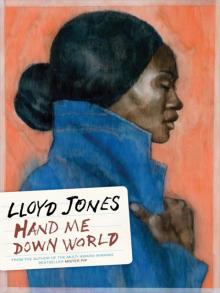 Hand Me Down World
Hand Me Down World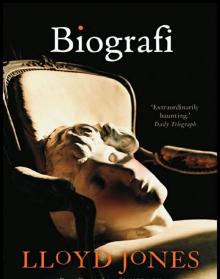 Biografi
Biografi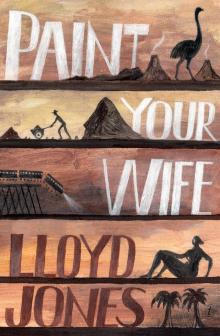 Paint Your Wife
Paint Your Wife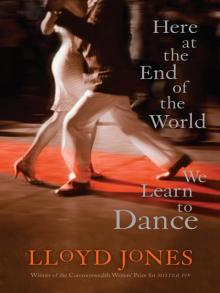 Here at the End of the World We Learn to Dance
Here at the End of the World We Learn to Dance My First Colouring Book
My First Colouring Book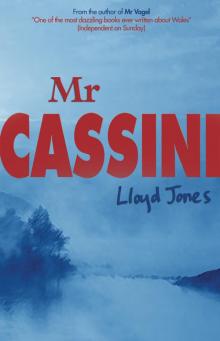 Mr Cassini
Mr Cassini See How They Run
See How They Run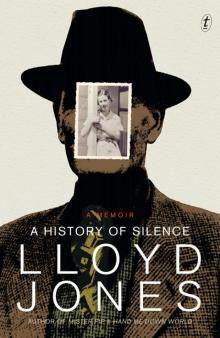 A History of Silence
A History of Silence The Book of Fame
The Book of Fame